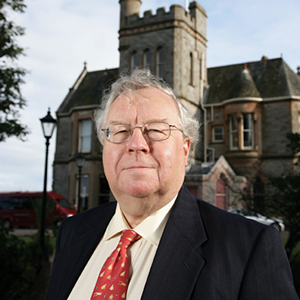Sir Patrick Cormack: parliamentary memories
 Outgoing Northern Ireland Affairs Committee Chairman Sir Patrick Cormack ponders 40 years of work in the House.
Outgoing Northern Ireland Affairs Committee Chairman Sir Patrick Cormack ponders 40 years of work in the House.
I entered the House on the same day as Ian Paisley and I well remember sitting in front of him when he made his maiden speech. No one could fail to be impressed by his forceful eloquence and his mischievous smile, and over the years we became good friends. On the eve of direct rule, in March 1972, our younger son was baptised in the Chapel in the Palace. During the course of the afternoon politicians from Northern Ireland were scurrying hither and dither, and both Dr Paisley and the late, great, Gerry Fitt, wished the infant well, Gerry crossing his palm with silver. Ian often reminds me of that afternoon.
As I look back, memories of Northern Ireland, and its politicians, come thick and fast. I remember that grim day after Bloody Sunday when Reggie Maudling, the most benign and affable of Home Secretaries, was struggling to make his statement to the House. Suddenly Bernadette Devlin darted across from the opposition benches and proceeded to punch Maudling, as he stood bemused, and transfixed, at the dispatch box.
In March 1979 the Labour Government of James Callaghan was defeated in a vote of confidence because of the abstention, of Frank McGuire, the independent member for Fermanagh and South Tyrone. He had been brought over especially, at the invitation of the Labour whips, who felt they could count on his support. My wife and I celebrated the Government’s fall with Airey Neave, the Shadow Secretary of State, and his wife, Diana. Two days later Airey was assassinated by an INLA bomb as he drove out of the underground car park in the House. It was the second bomb in Westminster itself. An earlier one had caused considerable damage in Westminster Hall.
And I remember another tragic Northern Ireland death. I was summoned from the Chamber to be told that Brian Faulkner had been killed in a hunting accident and given the task of breaking the news to Prime Minister Margaret Thatcher.
So many of these early recollections are sombre ones, none more so than the devastating news of August 1998 when, on holiday in the tranquil Inner Hebridean Isle of Ghia, we heard of the Omagh bomb. Two days later I was on the train to London for an emergency session of Parliament.
When I entered the House the unionists were all Ulster Unionists, and they were part of the Conservative and Unionist Party. I shared a bench with the likes of Willie Orr, Rafton Pounder, Stratton Mills and Robin Chichester Clarke.
The last five years of my parliamentary life have been dominated by Northern Ireland because in July 2005 I took on the chairmanship of the Northern Ireland Affairs Committee. It has been a delight to get to know the province and its people well, and to be able to play a part in demonstrating that party differences can be overcome. For our committee has produced a series of important unanimous reports on controversial topics, such as organised crime, prisons, and, most recently, the aftermath of the Omagh bombing.
Nothing can better symbolise the progress that has been made in Northern Ireland, and in relations with the Republic, during my parliamentary lifetime than the story of my first and last visits to Dublin. The first was in 1970 when I went to speak at a conference organised by students at Trinity College, one of whom was a former pupil. Having a quiet drink in a country pub we were approached by the landlord and told our presence was not welcome, and given 15 minutes to leave. On my last visit I was presented with a most beautiful chess set, a gift from the Foreign Minister, to mark my committee’s contribution to improving British-Irish relations.





